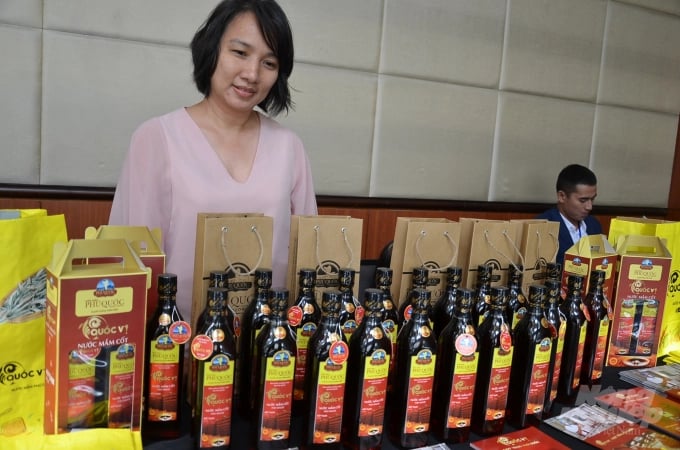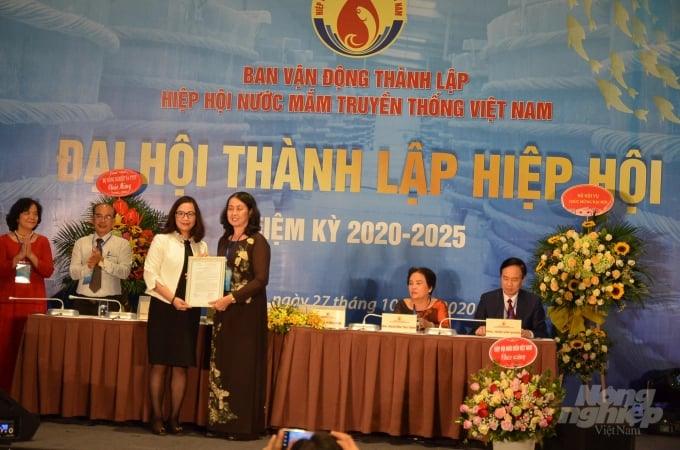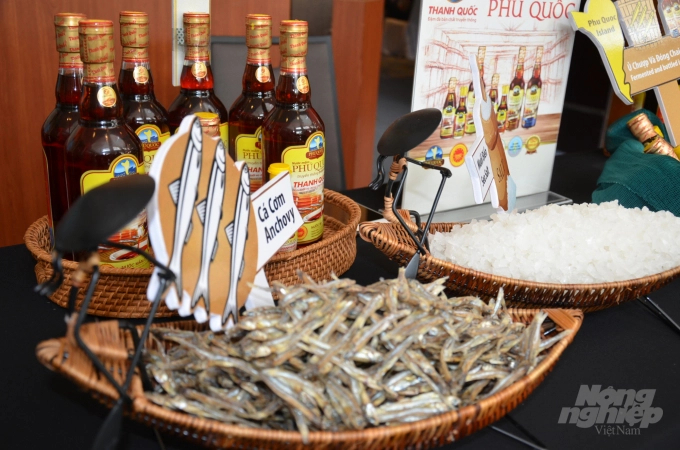November 21, 2025 | 19:45 GMT +7
November 21, 2025 | 19:45 GMT +7
Hotline: 0913.378.918
November 21, 2025 | 19:45 GMT +7
Hotline: 0913.378.918

Traditional fish sauce products are displayed at the launching ceremony. Photo: Duong Dinh Tuong.
The Vietnam Traditional Fish Sauce Association was officially launched in Hanoi on October 27, uniting the traditional fish sauce manufacturers in the face of harsh competition from industrial “dipping sauce”.
Speaking at the launching ceremony, chairman of the Vietnam Chamber of Commerce and Industry (VCCI) Vu Tien Loc said the foundation of the fish sauce association was the joy of tens of millions of families about a traditional and unique culinary product.
Harvard professors have long ago said Vietnam has a competitive edge in agricultural and food products and suggested turning Vietnam into the world’s kitchen, Loc said.

Representative of the association receives the certificate of establishment. Photo: Duong Dinh Tuong.
According to researchers, fish sauce production has been formed and developed over the past 300 years in coastal villages of Vietnam.
Different brewing and distillation recipes will produce different fish sauce whose taste and colour depend greatly on climatic conditions, soil types, fish and salt.
With the same recipe of fermenting anchovies in wooden vats for 9-12 months, the sauce made in the South has a lighter scent than in the North due to more sunshine and less humidity.
The fish sauce market has recently witnessed increasingly fierce competition between traditionally and industrially-made fish sauce. Costly advertisement campaigns of industrial “dipping sauce” on television and newspaper have pushed traditional fish sauce makers into hardship with many families having to quit their business and go bankrupt.
After the defamatory campaign of “traditional fish sauce with arsenic” scandal initiated by the Vietnam Standard and Consumer Association (VINASTAS) in October 17, 2016, traditional fish sauce businesses recognised the need to cooperate to co-exist. They formed the Vietnamese Traditional Fish Sauce Club under the Vietnam Association of Seafood Exporters and Producers (VASEP), which after nearly four years was today’s association.
Though other Asian countries such as China, South Korea, Japan and Thailand have their own fish sauce industry, Vietnam still tops the world with production capacity of 170-180 million litres per year with distinctive quality.
However, the traditional sauce accounts for only about 30% of the market share.
Therefore, the foundation of the association with 117 members is a new stride in the history of the Vietnamese traditional fish sauce production. Many members have succeeded in selling products on the giant e-commerce platform Amazon as well as in supermarkets in many countries.
Its existence is not simply for economic purposes but also for cultural motivation which wants to protect a traditional valuable culinary product.
"Fish sauce is in the blood of each Vietnamese and the taste of the homeland."

Traditional fish sauce consists of only anchovies and salt. Photo: Duong Dinh Tuong.
Author: Duong Dinh Tuong. Translated by Huyen Dan. Edited by Tran Doanh.

(VAN) This assistance supports people who temporarily relocate or evacuate, as well as communities affected by major storms from late September to now.

(VAN) Viet Nam will host the 8th ASEAN Heritage Parks Conference, bringing together over 320 delegates and reaffirming its role in regional nature conservation.

(VAN) According to MAE, heavy rains and flooding from November 16-19 caused major losses in lives, homes, and agricultural production across the central provinces.

(VAN) Amid vast floodwaters, the spirit of sharing and helping others shown by many people in Gia Lai reached tens of thousands of residents stranded by raging floods.

(VAN) Climate change is set to emerge as a key focus of collaboration within the framework of the Comprehensive Strategic Partnership between Viet Nam and New Zealand.

(VAN) Future veterinarians will be the ones directly deciding how antibiotics are prescribed, administered, guided and managed across thousands of farms nationwide.

(VAN) Argentine Ambassador Marcos Antonio Bednarski says Viet Nam is playing an increasingly influential role in Argentina’s economic and technical engagement in Southeast Asia, as Buenos Aires is seeking long-term partners.